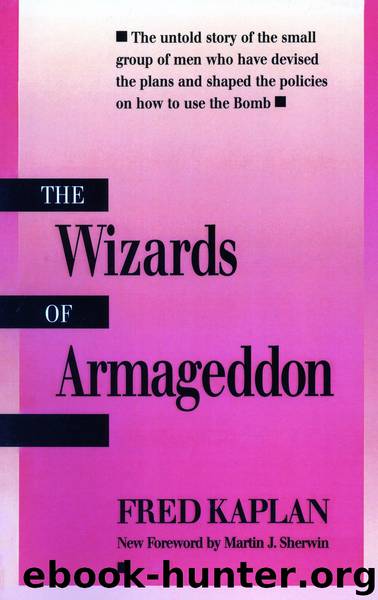The Wizards of Armageddon (Stanford Nuclear Age Series) by Fred Kaplan

Author:Fred Kaplan [Kaplan, Fred]
Language: eng
Format: epub, mobi
Publisher: Stanford University Press
Published: 2016-11-04T04:00:00+00:00
16
THE WHIZ KIDS
BY THE TIME of the 1960 Presidential campaign, defense intellectuals were riding high. The missile gap was very much on everyone’s mind, as well as an image of a sagging defense posture and eight years of a complacent Republican Administration. The marketplace was filled with books and articles on how to solve the problems of national security in order to meet the crises that lay ahead.*
Onto this stage stepped John Fitzgerald Kennedy. Vigor, youth, the “New Frontier,” “getting the country moving again“—these were the themes of Kennedy’s Presidential campaign, and not least on the subject of national security. As much as anyone, Kennedy had milked the missile-gap phenomenon for political capital. From his days as a congressman in the early 1950s, Kennedy had hooked himself to the advocates of Air Power. As early as February 1956, he was warning that “the United States might well be behind the Soviet Union” in missilery. A year later, he stated that if present trends were not reversed by 1960, “this nation will have lost its superiority in strategic air power.”
His most dramatic missile-gap speech was delivered on the Senate floor August 14, 1958. Its impact was so potent that Republican Senator Homer Capehart of Indiana threatened to clear the galleries on grounds that Kennedy was disclosing information harmful to the national security.
“We are rapidly approaching that dangerous period which General [James] Gavin and others have called the ‘gap’ or the ‘missile-lag’ period,” Kennedy proclaimed. Sometime between 1960 and 1964, “the deterrent ratio might well shift to the Soviets so heavily . . . as to open to them a new shortcut to world domination.” The Soviets’ “missile power will be the shield from behind which they will slowly but surely advance—through Sputnik diplomacy, limited brushfire wars, indirect non-overt aggression, intimidation and subversion, internal revolution, increased prestige or influence, and the vicious blackmail of our allies. The periphery of the Free World will slowly be nibbled away. The balance of power will gradually shift against us.”
In a speech delivered in April 1959, Kennedy pinpointed the main problem in our defense posture as “the problem of protecting our striking power, making it more secure against enemy attack.” He emphasized that “even if the missile gap were somehow ended and our supply of ICBMs equaled that of the Soviets, we would still be on the short end of the deterrent ratio. . . .” Taking a page from Wohlstetter’s “Delicate Balance of Terror,” the candidate noted that “there is no security in merely matching . . . the ‘first-strike’ forces of the Soviets. . . . The real question is how large will [our] force be after the first Russian strike? How secure is it against destruction?” Taking another page from the RAND studies (and the Gaither Report, which they influenced), Kennedy urged the hardening of SAC bases (including putting bombers and missiles in “underground hangars covered by very thick, reinforced concrete roofs”), dispersing the bases and making some weapons mobile.
Surreptitiously, a small team of RAND analysts was aiding the Kennedy campaign.
Download
The Wizards of Armageddon (Stanford Nuclear Age Series) by Fred Kaplan.mobi
This site does not store any files on its server. We only index and link to content provided by other sites. Please contact the content providers to delete copyright contents if any and email us, we'll remove relevant links or contents immediately.
| Africa | Americas |
| Arctic & Antarctica | Asia |
| Australia & Oceania | Europe |
| Middle East | Russia |
| United States | World |
| Ancient Civilizations | Military |
| Historical Study & Educational Resources |
The Radium Girls by Kate Moore(12022)
100 Deadly Skills by Clint Emerson(4922)
Rise and Kill First by Ronen Bergman(4784)
The Templars by Dan Jones(4686)
The Doomsday Machine by Daniel Ellsberg(4489)
The Rape of Nanking by Iris Chang(4209)
Killing England by Bill O'Reilly(4000)
Stalin by Stephen Kotkin(3962)
Hitler in Los Angeles by Steven J. Ross(3943)
12 Strong by Doug Stanton(3544)
Hitler's Monsters by Eric Kurlander(3334)
Blood and Sand by Alex Von Tunzelmann(3201)
The Code Book by Simon Singh(3186)
Darkest Hour by Anthony McCarten(3124)
The Art of War Visualized by Jessica Hagy(3006)
Hitler's Flying Saucers: A Guide to German Flying Discs of the Second World War by Stevens Henry(2754)
Babylon's Ark by Lawrence Anthony(2674)
The Second World Wars by Victor Davis Hanson(2524)
Tobruk by Peter Fitzsimons(2514)
